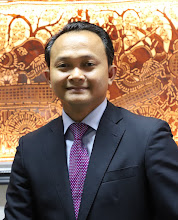Strategic Advisor of Asian Vision Institute (AVI)
Forward thinking and positive contribution for the betterment of Cambodian society
Friday, February 14, 2020
COVID-19 brings out the best in Cambodia: Small Country, Big Heart
Strategic Advisor of Asian Vision Institute (AVI)
Wednesday, February 12, 2020
Cambodia faces questions of conscience, self-reliance
Asia Times, Opinion
https://asiatimes.com/2020/02/cambodia-faces-questions-of-conscience-self-reliance/
February 12, 2020, was reported widely as “EBA judgment day” when the European Commission announced its decision to withdraw temporarily some trade preferences Cambodia had enjoyed under the Everything But Arms deal between Phnom Penh and the European Union.
In effect, a supranational body of one region is imposing its judgment over a sovereign state in another region. How powerful does that sound, when an extraterritorial judgment can be executed thousands kilometers away?
Cambodia is being punished based on criticism of imperfections in its democratic progress and evolution as a nation. In fact many self-acclaimed midwives delivered a baby democracy in Cambodia that falls repetitively as it learns to walk.
The EC decision creates the temptation to recall the history of the “white man’s burden” and “mission civilisatrice” (civilizing mission). The dialogue that was undertaken leading up to the decision was a challenging discourse of empathy, a constant fight with mutually justified egos, and most of all questions of conscience. The desire for independence that may cause economic casualties, the ambition to be freed from conditions, the desire to move on toward the future, the righteousness and sense of self-appreciation for noble and altruistic deeds offer links with the causes of humanity.
There is a Khmer saying, “Klean cha-gnanh, srolanh la-or,” literally translated as “Food is good when you are hungry; seeing beauty when you are in love.” In this sense, looking at the European Union’s trade practices in the region, it is observed that the shady records of universal values can sometimes be overruled by the beauty and strengths of market capitalism. But imposing punishment under laws and values that are supposed to protect people seems to prove otherwise, as no one really knows the exact impacts of this punishment.
It is like in William Shakespeare’s The Merchant of Venice where Shylock demands “a pound of flesh” for a due debt and claims that he has that right under Venetian law:
“What judgment shall I dread, doing no wrong?….
The pound of flesh, which I demand of him,
Is dearly bought; ’tis mine and I will have it.
If you deny me, fie upon your law!
There is no force in the decrees of Venice.”
But Shylock cannot challenge the natural human law that “a pound of flesh” cannot be taken without shedding blood. The questions of universality of values and principles also lead to questions as to what those values and principles are for in terms of people’s livelihood.
How do we measure impact? Different state institutions provide different levels of impact analysis, from minimal and manageable impacts claimed by the government to the industrial fallout as claimed by some pessimistic critics and doomsday prophets.
Now, on the question of self-reliance. The interdependence that the world has benefited from can be both a strength for development and a disruptive power. On the positive side, interdependence magnifies mutual benefits; in negative terms, interdependence undermines self-reliance.
Cambodia relies on China for investment capital, production chains and material supplies. Cambodia relies on Europe for a market for the finished products made from those materials. A disruption of China’s supplies due to the recent coronavirus outbreak can cut short delivery to European markets. Likewise, restricted access to the European market due to the partial EBA withdrawal can also cut short factories’ purchase orders.
Thus the question of over-reliance here is not only about China. Cambodia, which is in the middle of this production and supply chain, can be said to be over-reliant both on China and the EU.
Apart from the issue of diversity, questions can be pondered about the lack of competitiveness and vulnerabilities of Cambodian economic structures, and probably matters of complacency and sluggish reforms to adjust economic structures and enhance the country’s competitiveness in the region.
Challenges for Cambodia’s economy will be multiple and global in nature. China’s economic slowdown, a global disruption of supply chains due to the coronavirus, impacts from the partial EBA withdrawal, trade wars, geopolitical rivalry between superpowers and regional powers, weak domestic competitiveness compared with other nations in the region, lack of diversity – these are among the compounding factors that may slow down Cambodia’s economy.
Come what may, adaptive solutions will be devised including market and supply-chain diversification, drastic internal reforms, economic stimulus packages, social safety nets, and human capital development. The recent chain of events could provide an exceptional opportunity and driving force for Cambodia to push for a gradual economic structural shift from a low-skilled, labor-intensive growth model toward a knowledge-based and skills-driven one.
Cambodia has braced itself for these challenges. Cambodia will move on. Cambodia will adapt and transform.
About Me
Total Pageviews
-
Khmer Times, Opinion, 1 February 2022, ( Link ) A man that is known far too much for his harsh words but very less on his dedication to pea...
-
Khmer Times, Opinion, 2 August 2023 ( Link ) This is a dream. We have been waiting for the Japanese to come for so long but their investme...
-
Khmer Times, Opinion, 23 January 2023 ( Link ) In his memoir, Lee Kuan Yew remarked that Cambodia’s “present leaders,” meaning Hun Sen, “are...
Search This Blog |





